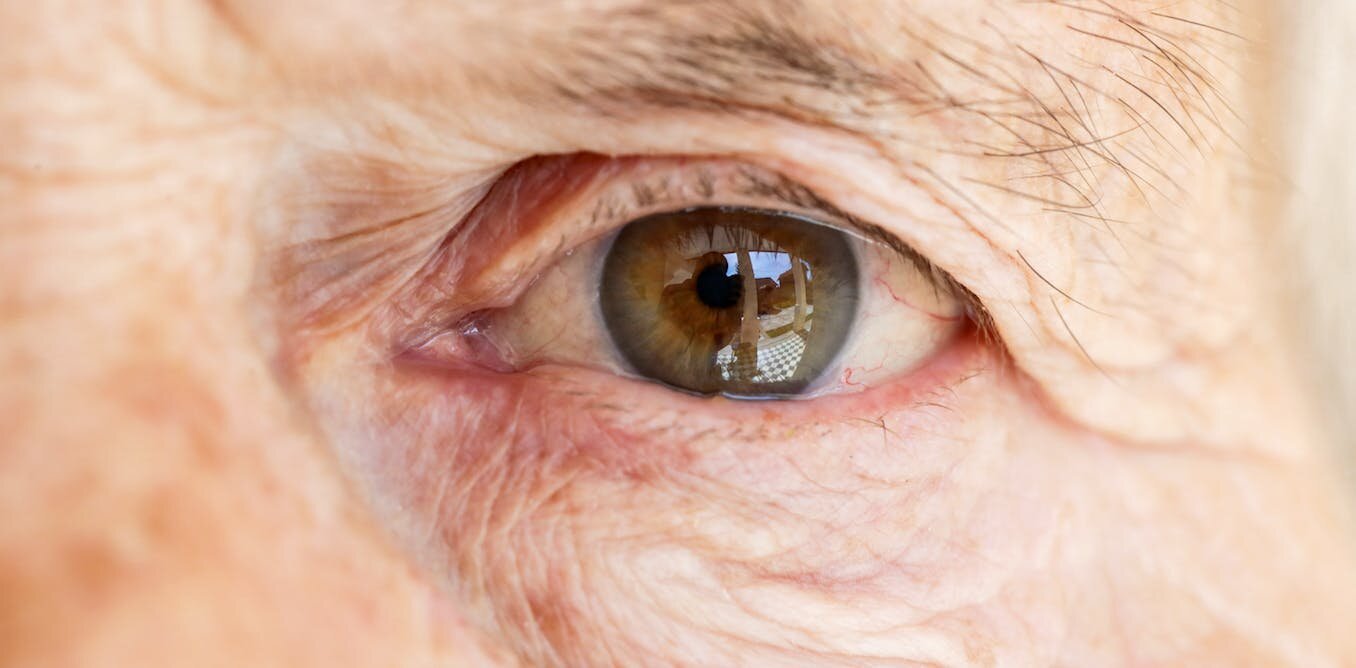
If you look up at the sky on a clear day, you might notice little cobweb-like structures drifting across your field of vision. They are known as floaters or, more formally, muscae volitantes—Latin for flying flies.
Like regular flies, muscae volitantes are rather pesky, so it’s not surprising that people want to banish them. A recent article in the Mirror, Eye floaters: What causes them and how to get rid of them naturally, claims to have a solution.
Sarah Brewer, a GP, is quoted in the article as saying that a supplement called Clearer, made by Theia Bio, is “a natural but effective solution to address annoying floaters.” Despite the promise in the headline, Dr. Brewer does not talk about getting rid of floaters.
The Theia Bio website uses more precise language. It says, “Clearer contains a blend of antioxidants and antiglycation micronutrients that has been scientifically proven to reduce eye floater size and visual discomfort in around 70% of test subjects over six months.”
Before we look at the feasibility of a supplement to “address” annoying floaters or reduce their size, let’s look at what floaters are and why they occur.
The main reason floaters occur is age. With age, the vitreous—a clear, gel-like substance inside the eye—starts to thicken and shrink. Vitreous consists mostly of water, collagens and an acid called hyaluronan. Over time, the vitreous degenerates slightly and little clumps of collagen begin to form. Floaters are the shadows these clumps cast on the retina.
With age, it’s normal for the vitreous to pull away from the back of the eye, a process called posterior vitreous detachment, and this causes more floaters.
Is it possible that vitamin supplements could affect the clumps and strands of collagen, to improve the vitreous? In 2022, researchers in Taiwan reported that taking high-dose mixed fruit enzyme supplements could reduce floaters, but it’s not clear how they measured the number of floaters, so it is difficult to judge this study properly without more information.
Theia Bio, the company that Dr. Brewer was speaking in partnership with, shares a link to a study on its website as scientific proof that the Clearer supplement can “reduce eye floater size and visual discomfort.” But floaters are tricky to measure because the vitreous is mobile. Every time you move your eyes, the vitreous opacities (the floating objects in the vitreous) move, and the floaters—the shadows the vitreous opacities cast—move too.
The vitreous clumps are 3D, not 2D, so catching them from different angles affects the measure you take and floaters appear bigger when they’re closer to the front of your eye. The reduction in opacity size in the study is based on just 26 people who took the formulation, and opacity sizes were reported in a 2D measure (cm²).
This small trial does not convince me that floater size can be reduced with this dietary supplement.
What about other solutions?
There are a couple of medical ways to get rid of floaters. The most accepted is a procedure called vitrectomy, which surgically removes the vitreous. But this surgery poses risks to a person’s vision far more significant than the floaters themselves.
Zapping floaters with a laser (known as a YAG laser) is another option, but not all experts agree that this is safe. Worryingly, several private companies offer this treatment as a good solution, even though there are reports of damage to various eye structures and glaucoma as a result.
Other “solutions” suggested online include intermittent fasting, temple massage and acupressure, as well as eye exercises. But there is no credible evidence for these.
There is some evidence that lifestyle factors can accelerate or decelerate aging in the eye more generally, which might affect the age you first notice floaters, or how large or troublesome they are. For example, eating lots of vegetables rich in carotenoids (spinach, broccoli, watermelon, pink grapefruit) and fatty fish containing omega-3, may help people at risk of age-related macular degeneration.
Emerging evidence also suggests that excessive exposure to blue light from mobile phones, tablet computers and LCD screens might also accelerate age-related eye changes. But while slowing aging in the eye would be great, it’s not proof that it will stop people from getting floaters.
So what should you do if you find yourself troubled by floaters? Mostly, the best thing to do is ignore them. Over time, the brain adapts and we notice them much less.
You’re more likely to get floaters if you are shortsighted, had cataract surgery, or if you’ve had eye inflammation (swelling). And you might have more floaters if you have diabetes, so glucose and diabetic control are important.
Occasionally, floaters can be signs of a serious condition. If you suddenly notice a lot of new floaters or flashes, or if a shadow or gray curtain comes down over your vision, this could indicate a retinal tear needing urgent surgery.
The verdict
Can supplements “address” collagen clumps in the vitreous? There is little evidence to support this at present.
Can supplements and lifestyle changes slow the aging process in the eye, delaying the onset of these age-related floaters? Possibly.
Dr. Brewer makes excellent recommendations about nutritious food, hydration and sleep—all great ways to maintain your health. It’s doubtful that it will have a direct impact on floaters, but it’s great health advice generally and might delay the aging processes in the eye by which they arrive.
Kawa Wong, the founder of Theia Bio, told The Conversation that his company “does not promise a cure for eye floaters; rather, it offers the best nutritional support for eye floater patients based on available scientific evidence.”
Provided by
The Conversation
This article is republished from The Conversation under a Creative Commons license. Read the original article.
Source: Read Full Article
